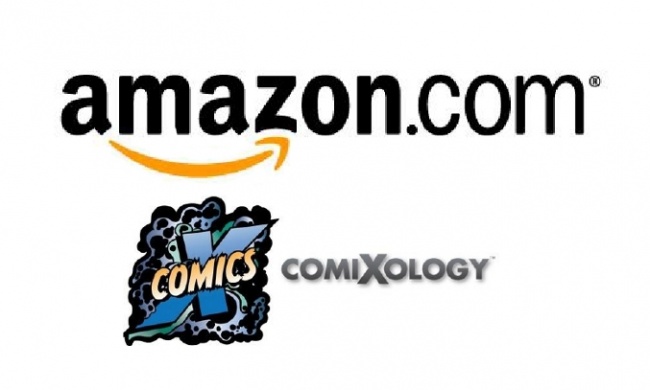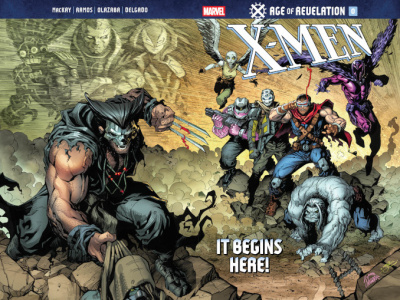Poor comiXology. In just five years, they came out of nowhere, scared the bejesus out of everyone, silenced their critics, mopped the floor with their competitors, showed comics a new way forward, then landed a cushy exit courtesy of one of the most feared and formidable retailers in history. It was a great story and they relished telling it.
Since then, what had been one of the most gregarious PR operations in the industry has been muzzled behind a curtain of corporate reticence. The only really major story from comiXology since the Amazon acquisition was pulling the plug on in-app purchasing for iOS – not exactly the news everyone was waiting for – more than a year ago.
Now, suddenly, Amazon, using its comiXology voice, has come roaring to life with a quartet of new announcements, some around new content partnerships and some around technology. The first and biggest was Thursday’s news about Marvel single issues coming to the Kindle Store.
At first glance, this seems like another nothingburger. Didn’t comiXology already have an exclusive on Marvel single issues? And who reads comics on Kindle when the Comics by comiXology app and the Marvel app, powered by comiXology technology, provide a far better reading experience?
But looking below the surface, this is big news for a couple of reasons.
This is an Amazon story, not a comiXology story. ComiXology already had substantial penetration among regular comic readers before it was sold, because lots and lots and lots of comic fans like the cX app and reading experience. That’s one of the reasons why it sold.
Kindle isn’t Amazon’s platform for reaching comic book readers. It’s Amazon’s platform for reaching all readers. comiXology counts its revenues in millions. Amazon counts its revenues in billions. Moving these titles from a superior specialty app to an inferior mainstream app isn’t a big deal for existing fans but it’s a huge potential expansion of the market.
Recent data that I’ve been gathering shows that those identifying themselves as "comics and genre-based media fans" are the largest, most demographically diverse and fastest-growing subgroups within fandom. Amazon clearly thinks this is a good way to reach them.
Exclusive compared to who? One of the reasons that comiXology has been so boring to write about lately is that they ran the table so completely in the digital comics market that the only competitors left are shopworn holdouts and niche players. A big reason for their success was the exclusive agreements with DC and Marvel to distribute new single issues. So when we hear that this exclusive has been extended, it’s tempting to ask, who’s left that cares?
Again, this is an Amazon story, not a comiXology story. Amazon doesn’t compete with iVerse and MadeFire. Amazon competes with Google and Apple. Both of those companies spend more money in a day catering their company cafeterias than the whole comics publishing industry makes in a year. If they want to get serious about going after comic fans – and they do – it wouldn’t take much to spin up a serious platform, or acquire one of the remaining storefronts and infuse it with some serious cash and technology.
With Thursday’s announcement, that becomes a whole lot harder because…
Marvel is the ballgame. In the past year, Marvel has opened up a yawning gap in market share between itself, its nearest competitor, and everyone else. It’s possible that DC could right the ship with a post-Convergence burst of energy, but it needs to reverse a ghastly collapse in readership and retailer confidence to do it.
Marvel, meanwhile, is chugging away with a stable of commercially and creatively successful titles, bolstered by the biggest Big Media air cover in the universe. There’s a lot to like about what Image, IDW, Dark Horse and others are doing, but from the perspective of shareholders and the larger business world, the comics sun rises and sets on the House of Ideas.
Extending the Marvel exclusive and conspicuously name-checking Amazon in the announcement serves notice to Apple and Google. It’s a lot less appealing to open up a restaurant if you can’t have the main course on your menu.
Keep your eyes on the big money. The last hidden angle of this story is that it’s not really about comics at all. According to ICv2’s latest estimates, the entire comics publishing industry – direct market, newsstand, bookstore/trade and digital – is around $900M (see "Comics and Graphic Novel Market Reaches $870 Million"). Licensed merchandise based on that IP could be worth 50-100 times that, with the lion’s share going to Disney.
In other words, the big money isn’t in comics, it’s in stuff: videos, toys, t-shirts, videogames, branded Lego sets and everything else under the sun. You know who sells more stuff than just about anyone? Amazon!
And do you know who’s really good at using data to identify new customers and new upsell possibilities? I’ll give you three guesses.
So, just to summarize, we have the owner of the most valuable licenses – Disney – granting an exclusive distribution deal for its cornerstone story platform, Marvel Comics, to the largest, most data-driven retailer on the face of the earth, Amazon. And it’s all connected through a digital storefront and digital media.
Hmm… for a nothingburger of an announcement, I’m suddenly feeling rather full. And there’s more comiXology/Amazon news to come in the weeks leading up to Comic-Con. This is getting interesting again…
--Rob Salkowitz (@robsalk) is the author of Comic-Con and the Business of Pop Culture.
The opinions expressed in this column are solely those of the writer, and do not necessarily reflect the views of the editorial staff of ICv2.com.

Column by Rob Salkowitz
Posted by Rob Salkowitz on June 18, 2015 @ 2:35 pm CT
MORE COMICS
From Tiny Onion, Dynamite, Image, IDW
July 18, 2025
There are four Humble Bundle deals running right now, from Tiny Onion, Dynamite, Image, and IDW.
From Marvel Comics
July 18, 2025
Age of Revelation, a new status quo taking place 10 years into the future and arising out of current developments in the X-Men titles, begins in October.
MORE COLUMNS
Column by Rob Salkowitz
July 14, 2025
Superman isn't a character who needs a general introduction to the broader public; he just needs an existing global fanbase to take a fresh look.
Column by Scott Thorne
July 14, 2025
This week, columnist Scott Thorne discusses Green Ronin Publishing's GoFundMe to fund its legal fight against Diamond Comic Distributors, and the soft preorders for the latest Horus Heresy box.








